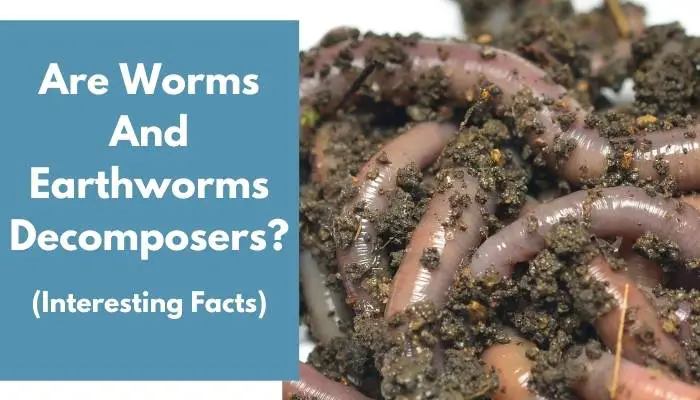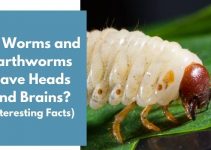Decomposer animals are a huge help for the soil and the environment. Decomposers break down decaying organisms. Let us discuss further what decomposers do and if worms and earthworms are decomposers.
So are worms and earthworms decomposers? The answer is yes. Worms and earthworms help in chemically breaking down organic matters into nutrients.
Worms and earthworms are mostly found in the soil. They love it there. These worms and earthworms eat their way into the soul.
This is why we see them in our garden a lot of times. We sometimes wonder what worms and earthworms eat. Do they eat soil, or do they eat live animals?
Worms and earthworms produce their food from decaying organic matter. These can be plants or animals that are not living anymore. Worms and earthworms will break down the organic matter and turn them into smaller parts.
Let us further discuss worms and earthworms and how they do as decomposers. Let us get started.
Contents
Are Earthworms And Worms Considered Decomposers?
To answer this question, let us discuss first what decomposers are. Decomposers are the ones who break down organic matters and turn them into nutrients. These nutrients are but are not limited to Phosphorus, Potassium, and Nitrogen.
These nutrients play a crucial role for the soil and the plants. In a simple manner, decomposers are the ones who recycle nutrients from decaying matters for nature. Worms and earthworms eat decaying matters, like plants and vegetables.
These decaying matters are turned into nutrients, and they will be able to make the garden soil healthy for plants. So worms and earthworms are decomposers.
They belong to a particular group of species. These species eat dead or decaying organic matter. This is what decomposers do.
Furthermore, decomposers play a very critical role in this earth’s food chain. It might seem like worms and earthworms are not essential, but they are. Worms and earthworms as decomposers recycle the energy and the nutrients from dead matter.
Related Articles:
Are Worms Decomposers Or Scavengers?
Let us define first what a scavenger is. So decomposers and scavengers are almost alike because they together break down dead plants and animals. Decomposers and scavengers also break down the waste of other organisms.
This is the role of decomposers and scavengers in our food chain. If decomposers and scavengers do not exist, our soil will never be healthy. Decomposers and scavengers provide food and nutrients for the ground.
So scavengers look for decaying matters and eat them. In return, scavengers will break these decaying matters into small pieces. Earthworms are decomposers, and they are scavengers too.
The only difference is that they only break down plants. Decomposers and scavengers are alike in the way they recycle organic matter and turn them into nutrients.
Scavengers break down dead plants. So worms and earthworms are both decomposers and scavengers.
Are Worms Decomposers Or Detritivores?
We have defined what a decomposer is and what they do. Let us now define what detritivores are. Decomposers have a lot of types.
Worms and earthworms are decomposers, and they are also detritivores. Detritivores are a type of decomposers that eat the decaying matter and then turn them into simple forms. Detritivores eat the decaying materials, and then they break them down into nutrients for the soil.
To simply put it, decomposers have different types. One type of decomposer is detritivores. An earthworm is a decomposer, and its kind is detritivores.
Detritivores consume the decaying matter before they break it down. This is the distinct function of detritivores.
And worms and earthworms are decomposers, and they are also detritivores because they do not just break down decaying matters; they also consume them before breaking them down into tiny pieces for the plants.
How Fast Do Worms And Earthworms Decompose?
Worms and earthworms decompose in about three months. In three months, they will start decomposing and will make nutrients for the soil.
What Do Decomposers Do?
We wish that everything can be recycled and decomposed. Decomposers eat dead things. These dead things include plants and other things that will decay.
Decomposers are the reason why things that can be decomposed are decomposing. These decomposers do their job by eating these decayed matters and turn them into nutrients for the soil.
In return, these nutrients will make the soil healthy and make the plants healthy. If decomposers do not exist, probably nothing can be decomposed.
Plants and animals that are deceased will not be gone and will continue to be a tangible thing. Decomposers are the ones who break down organic matters and turn them into soil nutrients.
Why Is An Earthworm Called A Detritivore?
Detritivores consume dead particles and turn them into food for the soil. Worms and earthworms are called detritivores. Here are some of the reasons.
1. Detritivore Breaks Down Dead And Decaying Materials
Worms and earthworms help in the ecosystem and the food chain by breaking down dead and decaying materials. These worms and earthworms will consume the decaying matter and turn them into calcium, phosphorus and give some nutrients to the soil.
This is an important species because, without detritivores, plants will not decompose. They have the main job of decomposing materials. They are the reason why decaying matters decay and rot.
They are the reason for decomposing. It might be unknown to others, but worms and earthworms play a vital role in the food chain and the earth’s ecosystem.
2. Detritivores Like Worms And Earthworms Help In Plant Growing
Worms and earthworms are detritivores, so that they help the soil be healthy and, in return, make plants grow healthy. This is why worms and earthworms are essential in developing a plant.
They help the soil become healthy and ready for planting. Worms and earthworms as detritivores help in nature and help maintain the natural course of the environment.
Summary
In summary, worms and earthworms are decomposers, and they play a massive role in the decaying process of organic materials. They also play an enormous part in the soil and for the plants.
Decomposers have been a vital element in decomposing, and without these decomposers, decaying particles will not turn into nutrients for the soil.



